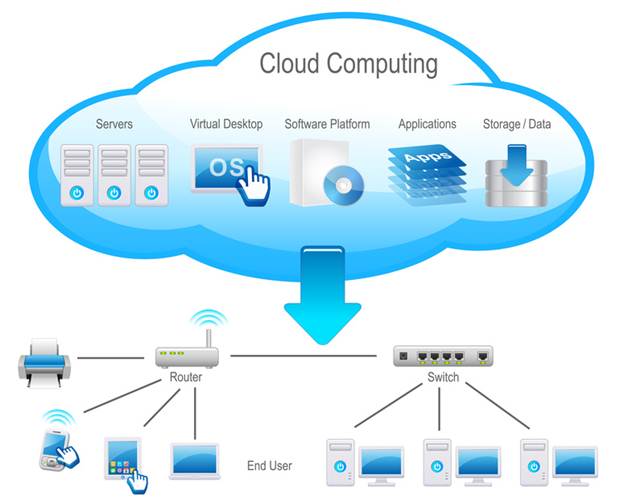Imagine an image of a cloud. Basically, the concept of cloud computing is patterned after that, wherein several components work together in a system.
What is cloud computing?
According to an article from the International Journal Of Computers And Communications, it refers to “a service provided by the internet network, which is used by subjects for running their information technologies.”
There are three types of cloud computing, which include IaaS (Infrastructure as a Service), PaaS (Platform as a Service), and SaaS (Software as a Service). So what does these mean?
-
IaaS – basically means hardware hiring
-
PaaS – provides application platform and the resources to maintain the application running
-
SaaS – hiring of a software, replacement/ successor to ASP (Application Service Provider)
Looking ahead
Recently there was an increase in the number of companies that offer cloud computing. The projections for the next few years are really good.
Last year morganstanley.com, projected that there will be a 50% increase in public cloud workloads in the next three years. Moreover, it is expected that the compound annual growth rate through 2013 will reach 60%.
According to an article from The Wall Street Journal, Forrester released their forecast stating that the global market for cloud computing will grow from $40.7B in 2011 to $118.7B in 2014, and to more than $241B in 2020. Gartner also projects that in 2014 the industry will reach a revenue of $148.8B.
According to Access Markets International (AMI) Partners, Inc, in the US alone, spending for this service will reach $49B in 2015.
Why do people and companies use cloud computing?
There can only be an increase in the demand if there are great benefits to the customers and clients. There are many reasons why people choose to hire cloud services and these include, as provided by wikinvest.com:
-
efficient storage and computing services
-
it’s inexpensive (it covers all the needed services)
-
efficient connectivity and easy sharing
-
company resources are not wasted
-
available anywhere you are (as long as you have net connection)
-
and more
According to webhostingreport.com, companies hire cloud service because it reduces cost, provides more storage, automatic software updates, flexibility in computing, it’s mobile, no need to download additional software, and resources are shared by different companies (which is good).
What’s in store for SMBs?
The good thing about cloud services is that they not only make large companies grow, the SMBs also benefit from using their services. These small and sometimes start-up businesses can just focus in making their businesses grow rather than be concerned with software acquisition and maintenance, and in dealing with net security issues.
According to Microsoft’s Small/Medium Business (SMB) Cloud Study: Summary of US Study Results (May 2012), cloud users are three to five times more positive compared to noncloud users regarding the benefits of the service. The biggest benefit of cloud services to SMBs is IT cost savings – 26% of IT budget is saved.
There was also a decrease in spending for security (5 to 6 times lesser compared to noncloud users). Furthermore, 18 hrs are saved per week in security management. The noncloud users spend 32% more of their time for security management.
The issue of data security
The biggest hurdle to companies in deciding whether to use cloud services or not is data security. In the US, it is the top reason why companies hesitate to adopt cloud services. The security standards drastically improve that’s why more and more people trust cloud services in providing their business needs.
Rather than spending a lot of resources in making sure that their system is secure, SMBs invest in cloud services.
Closing thoughts
Cloud services is one way of canceling out the inherent disadvantage of small and midsize businesses as compared to the larger ones. It’s one way of ensuring that these businesses can focus in making their businesses grow. On the practical side, they save a lot. As a result, less worries because there’s no need to slash budget somewhere else just to make sure that everything is running well. And their system is secure. That’s the best part of it.
The projections are out, and cloud services will be a bigger industry. The SMBs will grow with it.
With the growth of cloud computing, what’s in store for small and medium-sized businesses? Ric explores the projections for cloud computing in the next few years. Find more of his posts at Divorce Wellington and Divorce Boca Raton.

